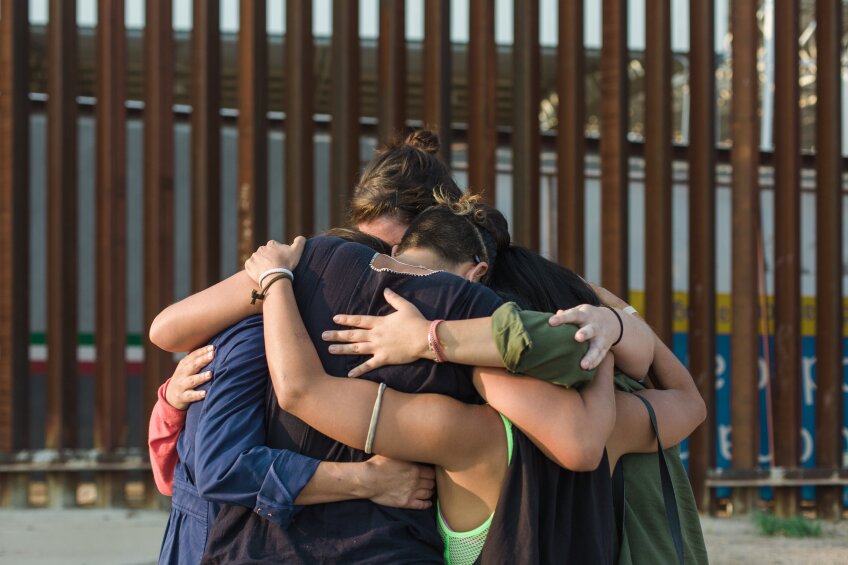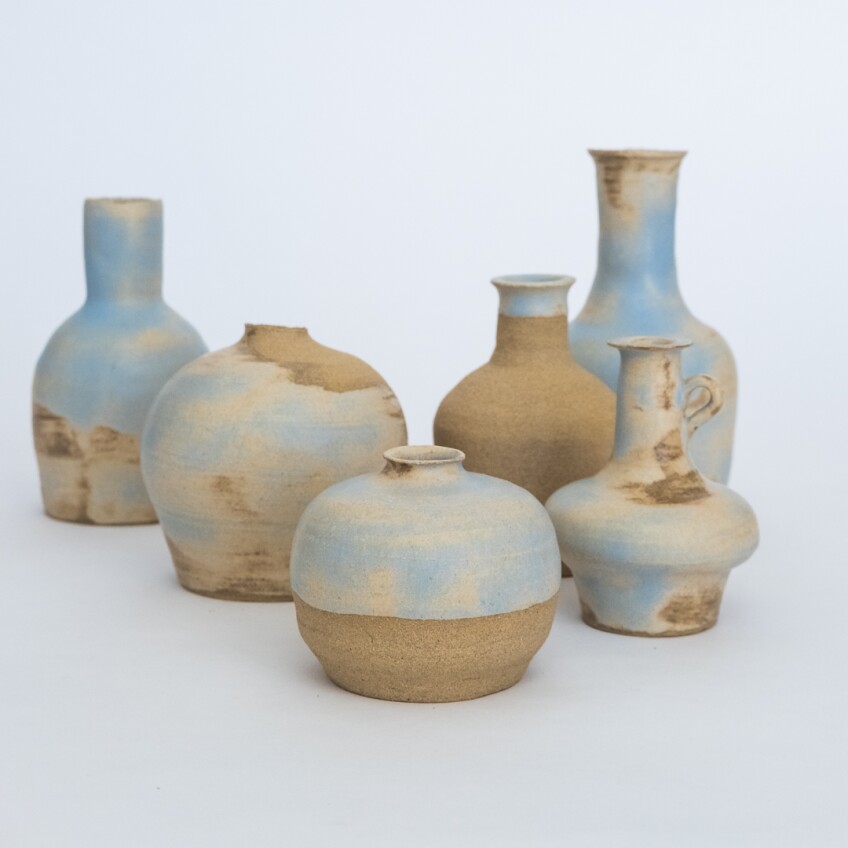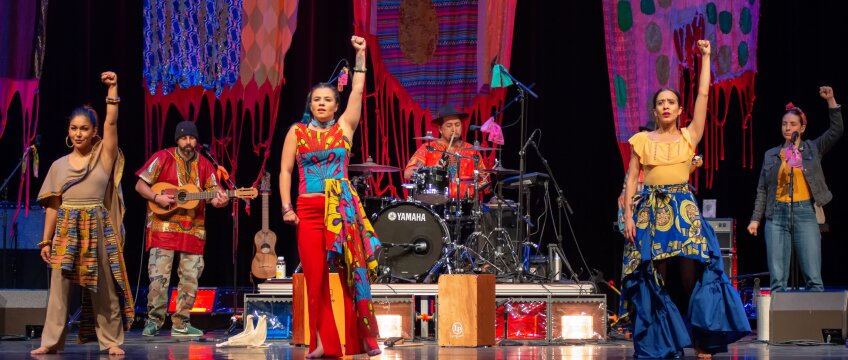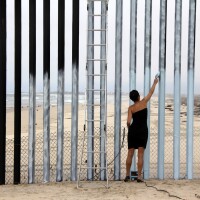Free at Frieze LA, BIPOC Exchange Highlights the Role of Artists in Social Change

Editor's note: This post has been updated to reflect the latest schedule for the BIPOC Exchange and parking information.
After a two-year hiatus, Frieze Los Angeles is back. Tickets are already sold out, but even if the admission prices are beyond your price range, the art fair has opened another avenue to enjoy a taste of L.A.’s cultural riches: the BIPOC Exchange.
Set up in a garden area inside the Beverly Hilton hotel, the BIPOC Exchange features 10 organizations handpicked by artist Tanya Aguiñiga. Her artistic practice empowering communities especially at the border made her a natural choice for the daunting task of winnowing down L.A.’s multitude of artist-led projects serving our society. Visitors can expect performances, workshops, but also items available for purchase. Profits will go towards the advocacies of the organizations.
KCET asked Aguiñiga about how she made her selection and her views on the role of art in communities.

How did this project come about?
I actually did a BIPOC Craft Fair last November. My friend Porfirio Gutiérrez, who is an Indigenous Oaxacan artist who works in Ventura, was doing a residency at my studio. I thought the best way to introduce his work to people in L.A. was to have a massive studio event. We set up an exhibition in the downstairs part of my studio and flanking his exhibition was the BIPOC Craft Fair. The new director of Frieze [Christine Messineo] heard about it and She had already been thinking about something like this for Frieze L.A, so she reached out through a friend of mine. It’s only been a little over a month, working on everything and planning out the best focus for the collaboration.
Rather than a whole massive showcase, you decided to pursue a more targeted approach. Why was that?
The BIPOC Craft Fair last November was a big affair and was very time consuming. I didn’t know if I wanted to do that again. What made sense though was to invite artist-led projects that were focused on social justice, on seeding change in our city.
How did you choose the organizations at the BIPOC Exchange and what does that say about the role of the artist in society?
With Frieze, a majority of the stuff that’s going to be exhibited are paintings, sculptures. I really wanted to expand the idea of what we think of as art. Is floral arrangement art? Is poetry art? Is movement art? These are all different forms that art takes.
I also wanted this to expand our idea of all the different needs that art serves, including the populations in L.A. that they serve — unhoused people; abolitionists; people in mourning; those dealing with mental health; people that work with young folks, non binary and Indigenous.


Could you tell us a little bit more about some of the organizations that will be at the exchange?
Every organization is so intersectional. Thinking of People’s Pottery Project, they do pottery, but it is also craft and design. They’re also addressing social justice issues with their work with formerly incarcerated folks, women and trans folks. It’s amazing what they’re able to do with such a simple material like clay.

With all of the organizations, I was completely blown away by how their art form serves different needs in our community and how vast and expansive everybody’s practice is in what they do. Like Contra-Tiempo, I never thought about activism as something you could do as dance. I thought of activism in a different way and different medium. Sometimes, we limit our own thinking of what a discipline can do and what an art form can do for us, but it really is something. It has so much power and the ability to really transcend materiality and convention.

This is a free event at the Frieze, open to anyone even without a ticket. Where will the BIPOC Exchange be?
The Frieze tent where all the galleries will be set up outdoors right in front of Beverly Hilton. We’re inside the Beverly Hilton in a garden area shared with the VIP Garden space. You don’t need a ticket to enter and you don’t have to pay.
There will be a lot of different organizations at the BIPOC Exchange doing different things, performances, poetry readings and workshops. [See the full schedule of events below.]
What do you hope people take away from the BIPOC Exchange?
I hope that people realize how easy it is to get involved in helping, how easy it is to support people doing really great work and how important it’s been for us especially now during the pandemic to have artists leading the way and showing different ways of being with each other.
Aside from the booths featuring the artist-led organizations and items for sale, here are events and workshops scheduled at the BIPOC Exchange.
Thursday, February 17
11 a.m. - 11:30 a.m.
Urban Voices Project: Music, Song, Storytelling
1 p.m. -1:30 p.m.
Tierra del Sol- Poetry reading
2:30 pm -3 p.m
Los Angeles Poverty Department performs excerpts from their latest performance, "The New Compassionate Downtown."
Friday, February 18
5 p.m. - 5:30 p.m.
Urban Voices Project: Music, Song, Storytelling
Saturday, February 19
12 p.m. - 2 p.m.
Classroom of Compassion crown making and flower arranging workshop for youth
4:30 p.m.- 5 p.m.
Urban Voices Project: Music, Song, Storytelling
Sunday, February 20
12 p.m. - 2 p.m.
Classroom of Compassion crown making and flower arranging workshop for youth
4 p.m. - 4:30 p.m.
Contra-Tiempo: Spoken Word and Participatory Dance Session
4:30 p.m.- 5 p.m.
Urban Voices Project: Music, Song, Storytelling
5 p.m. - 5:30 p.m.
Los Angeles Poverty Department performs excerpts from their latest performance, "The New Compassionate Downtown."
Parking
There is no parking at the Beverly Hilton. Paid public parking is available at Watt Plaza, an 8-10 minute walk from Frieze LA. Shuttles will run between Watt Plaza and Frieze Los Angeles. Parking rates are $3.50 per 12 minutes and $35 maximum.
